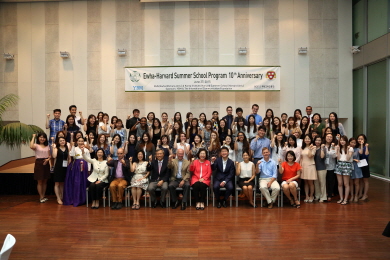
“When I first planned the program, I did not expect it to last 10 years,” said Kim Eun Mee, Dean of The Graduate School of International Studies, who planned EHSSP with Harvard professor Carter J. Eckert. “There were many concerns such as sustainability of ‘Hallyu.’ However, fortunately, every year we were able to maintain our program with new programs and professors.”
To memorize its long relationship, commemoration ceremony was held on June 27. “It not only taught me technical skills but also so much about Korean history, culture and society,” said Francesca Raquel Simoni from Harvard University.
Under the theme of “Cinema Korea: Documenting Korean Society through Film,” the course combines the field of film making with Korean culture and society. Along with film production, students get to explore how to interpret Korean society through the tool of a documentary.
This year, 23 students participated the program; 7 from Harvard, 2 from Michigan, 13 from Ewha and 1 from Hankuk University of Foreign Studies. For the lecture, professor Paul Chang of Harvard University and professor David Chung of the University of Michigan taught an course on Korean cinema and documentary film-making.
Staying in the Ewha dormitory for about five to six weeks together, all students were expected to make a short film as a final project. At the end, students presented their productions. The class also travelled to other cities such as Ulsan and Gwangju to further learn about Korean contemporary history.
“We often stayed overnight to edit the video, but the project was worth it and we became really close,” said Lee Gyung-min who participated in the program as an Ewha student.
On the day of closing ceremony, six films were presented at the “Documentary Film Festival” which were produced by students based on the theories from the course. For instance, “Assiduous: Work to live or Live to Work?” focused on the relationship between productivity and creativity in working condition of Korea which frequently requires working overtime.
“Throughout the course, student who didn’t have a clue about filming completed a documentary with historical and social meanings,” Kim said. “Students who had not known where Korea is have turned into people wanting to be Korean experts, even chaning their major. We would love to develop programs that introduce Korea to the world with people ‘from’ the world.”
Kang Na-min
jina6502@ewhain.net

